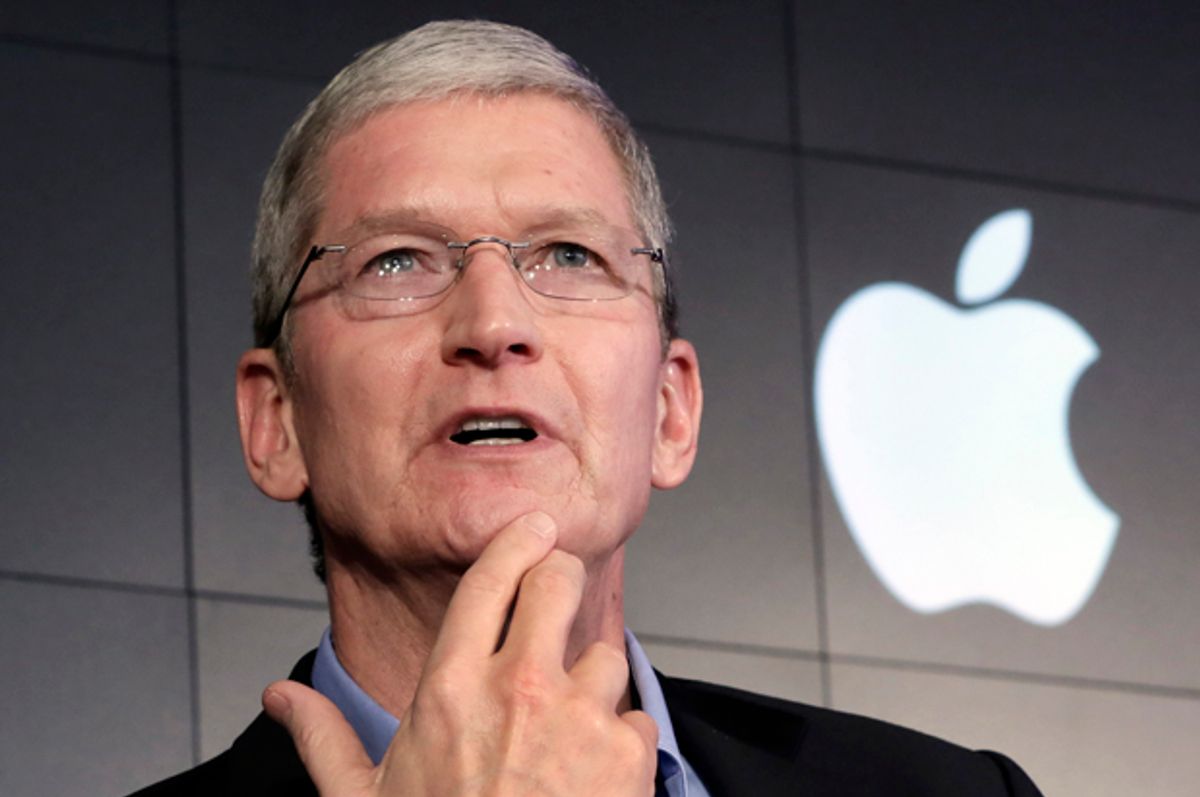 Surveillance in the 21st century deeply impacts minority communities in the United States, but they have almost no voice in the debate over spying and encryption compared to wealthy white males.
Surveillance in the 21st century deeply impacts minority communities in the United States, but they have almost no voice in the debate over spying and encryption compared to wealthy white males.
The latter group dominates the Washington, D.C., hearings, academic panels, and board room meetings where the most heavy-duty decision making is taking place, a Daily Dot review found.
Cook has become the leading voice in the fight for strong encryption largely due to his position as the chief executive of the world's most valuable company.
More from The Daily Dot: Seth Meyers is getting late-night right – and no one is watching
Minorities, on the other hand, have long been at the center of American surveillance, including when J. Edgar Hoover’s FBI put members of the 1960s’ Civil Rights Movement under their watchful eye. Today, communities of Muslim and black Americans sit right at the center of American surveillance.
Surveillance in the 21st century deeply impacts minority communities in the United States, but they have almost no voice in the debate over spying andencryption compared to wealthy white males.
More from The Daily Dot: For 'Broad City,' Content is Kween
The latter group dominates the Washington, D.C., hearings, academic panels, and board room meetings where the most heavy-duty decision making is taking place, a Daily Dot review found.
Cook has become the leading voice in the fight for strong encryption largely due to his position as the chief executive of the world's most valuable company.
Minorities, on the other hand, have long been at the center of American surveillance, including when J. Edgar Hoover’s FBI put members of the 1960s’ Civil Rights Movement under their watchful eye. Today, communities of Muslim and black Americans sit right at the center of American surveillance.
At a recent panel on the encryption debate in Austin, Texas, ACLU’s Principal Technologist Christopher Soghoian pointed out the disparity.
“This is a room filled with people who went to very good universities, most of whom probably make more than $100,000 per year, and many of whom already have a device in their pockets that encrypts their data by default,” he said. “The reason we’re having this debate is it looks like the poor and minorities and those who are most surveilled in our society are about to get encryption technology. And people are really upset.”
More from The Daily Dot: Can Kanye West Save Tidal?
Soghoian, who called the debate “a problem of equality and racial justice,” noted that the entire gathering included no African-Americans and no Muslims, “the people who are the most surveilled in our society.”
While this is by no means an exhaustive review of all recent important discussions of these issues, we believe the selection is representative the overall demographics of debate. It’s also clear that assigning ethnicities can be an inexact task at best, but we believe the count strongly reflects the color of the debate.
The situation for minorities and surveillance is similar outside the United States. In China, which already boasts the most heavily surveilled cyberspace on earth, the Muslim Uighur minority is subject to especially focused monitoring and harsh punishments.
Below is the collection of prominent events, hearings, letters, and discussions on the American encryption debate that informed our conclusions above:
- Feb. 12, 2016, The Frontiers of Cybersecurity Policy and Law, Session 1: The "Going Dark" Encryption Debate, six panelists: Five white males, one white female.
- Feb. 9, 2016, Senate Intelligence Committee hearing, five testifying and 12 senators: 13 white males, two white females, one black male, one East Asian female.
- Jan. 25, 2016, State of the Net conference, two speakers: One white male, one white female.
- Jan. 12, 2016, MSNBC interview, three participants: Two white males, one white female.
- Jan. 8, 2016, White House summit, eight known participants: Five white men, two white women, one black woman. Of the companies represented, they're run by seven white men and two Indian men.
- Jan. 5, 2016, panel on Immigration Policy and Counterterrorism, three panelists: Two white men, one white woman.
- Nov. 25, 2015, CNN interview, two participants: One white man, one white woman.
- Nov. 18, 2015, two Senate committees reviewing the use of encryption and its implications for national security, 36 Senators: 26 white men, two Latinos, seven white woman, one East Asian woman.
- July 8, 2015, Senate Judiciary hearing, 20 senators and two testifying: 18 white men, three white women, one Latino
- June 20, 2015, survey of popular encryption tools, 21 identifiable members of the boards of directors or development teams of noted tools: 16 white men, five white women.
- June 9, 2015, letter from tech industry groups supporting encryption, 19 identifiable people on the board of directors at SIIA, 65 chief executives as members in ITIC, seven recipients: 56 white men, 13 white women, 10 East Asian men, six Indian men, three black men, two East Asian women, one black woman.
- June 2, 2015, Electronic Privacy Information Center awards dinner, one speaker: One white man.
- May 19, 2015, letter to Obama on encryption, 57 individuals signed: 50 white men, six white women, one Middle Eastern man.



Shares